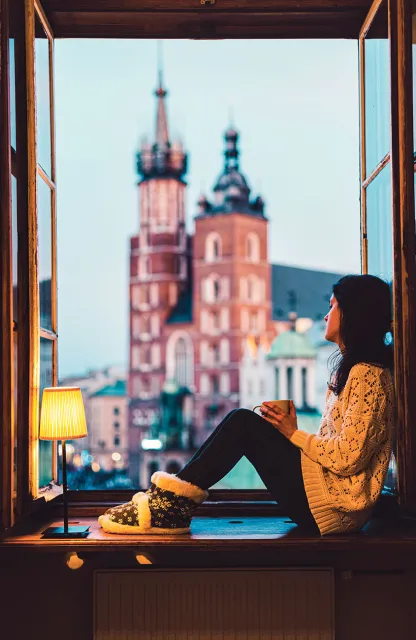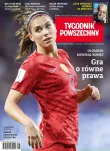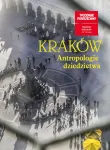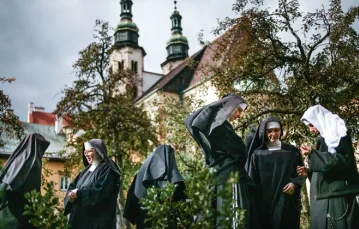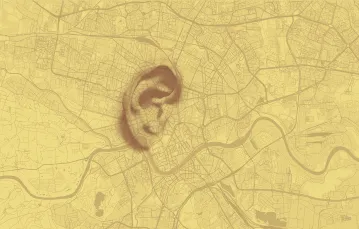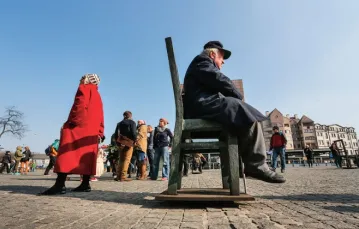Wykupienie dostępu pozwoli Ci czytać artykuły wysokiej jakości i wspierać niezależne dziennikarstwo w wymagających dla wydawców czasach. Rośnij z nami! Pełna oferta →
The camera takes one and a half minutes to rotate 360o. Along the way, it makes three stops, each lasting ten seconds. In the first, we can see the exit of Szewska Street and the Town Hall Tower. 70 metres tall, the tower does not quite fit in the frame.
The camera stops for the second time. White café umbrellas, a fragment of the Cloth Hall, and the paving stones of the Market Square – the largest medieval market square in Europe. It’s evening, it has just rained, and the lights throw long reflections onto the wet pavement.
The third stop is the Romanesque Church of St. Adalbert, historic town houses, and the towers of St. Mary’s Basilica. Our field of view only includes the lower tower. The camera waits 10 seconds and retraces its route like a pendulum. The image is broadcast live on the Internet, displaying the rhythm of life in the centre of Kraków.
Times of the Day
You could chronicle it hour by hour:
Nine o’clock. Michał, a student I meet in the Market Square, calls it “delivery o’clock”. The entire square turns into a huge car park. Suppliers, couriers, postmen, and other municipal services. They unload supplies, beer kegs and crates of vegetables, and then disappear. By ten o’clock, there will not be a single delivery van here.
Twelve o’clock. Someone is feeding the pigeons, while someone else is just passing through the frame, hurrying towards the railway station. The bugle call can be heard from the top of St. Mary’s tower. Traditionally, four of these are played. The first is for the king, the second for the mayor, and the fourth for the merchants. Today, the most important bugle call is the third, which is played in the direction of the Barbican and the station. This one is for tourists.
Eight o’clock in the evening. The river of tourists, which has been flowing through the Market Square for several hours, is becoming even thicker. It rises, spills over, and begins to get drunk. It overflows into the outdoor cafés, restaurants, and bars serving cheap vodka. Touts, British stag parties, and go-go club promoters start to appear. There is more of everything now in the Market Square.
Only the residents are disappearing.
More Than the City Budget
The Market Square and its adjacent areas are part of Kraków’s District No. 1 – the Old Town. Over the past decade, the number of people registered as its residents has dropped from 50,000 to 34,000. Only a thousand people live within the area encircled by the Planty Park, which is the very centre of the city. Former residents are being displaced by hotels, hostels, and short-term rentals. They are being driven out by the incessant noise, crowds, and the stench of urine in the stairwells of tenements. In fact, there are very few “citizens of the Market Square” today; locals mostly come to the Old Town to work.
Iśka works at a café in the Mały Rynek, which is a smaller square that adjoins the Market Square. “I call it ‘historical prostitution’”, she says. “We take our historic monuments, our houses and our heritage, and sell them to the world. And we are probably doing the right thing because it pays. But sometimes it’s worth remembering that we are also losing something along the way”.
It really does pay. Every year, Kraków is visited by 13 million people, of which 3 million come from abroad. According to a survey conducted by the Małopolska Tourist Organisation, tourists spent 5.5 billion zlotys in the city last year (excluding travel costs and accommodation paid for in advance). This is more than the city budget.
Inevitably, the rapid growth of tourism has led to the depopulation of the oldest historic districts and geared them towards visitors. This is a problem that even the largest cities struggle to cope with. Amsterdam has reduced its tourism promotion budget to zero. Venice has three times fewer residents than 60 years ago. In Barcelona, so far 39,000 people have been evicted from central districts as a result of rising rents, and graffiti has started appearing on the walls that reads: “Tourists go home!”. The Barcelonians have founded the ABTS (Assemblea de Barris per un Turisme Sostenible) – Neighbourhood Assembly for Sustainable Tourism. Members of the organisation protect residents from eviction, talk to politicians, and occupy hotels.
In an interview for Tygodnik Powszechny, Joaquín Linares from ABTS said: “We are not fighting against tourists, but rather against the tourism industry. That industry has made our city unliveable”.
Could Kraków go the same way?
Walking the Red Carpet
The online camera shows the Market Square from a second-floor vantage point. Marcin Wesołowski, author of the Wojażer travel blog, observes it from the same height. He used to run a hotel here for eight years.
“My wife and I lived directly on the Market Square. Living here became unbearable in 2014. We were the last ones to move out of our tenement house, where some really fantastic people had lived before. We turned out the light, so to speak”.
“Why?”.
“It all started inconspicuously. First, one of the apartments in our house was rented out to tourists. Every day, new people came to stay there. Cracks appeared in the fabric of our house – instead of our friends’ and neighbours’ familiar faces, we started to see strangers. And they brought chaos with them: noise, filth, and drunken shouting. I still remember a British couple who were having sex for two hours. They left the door wide open. After the first apartment, more followed – in fact, the entire first floor. A go-go club was set up there. At first, it was funny. We walked the red carpet to the door of our house and were greeted by security guards at the entrance. Things changed for the worse when the guards were replaced by new ones and every time I entered the house I had to explain that I wasn’t a customer and that I actually lived there. In time, the club became less exclusive and began to welcome all customers. It finally went bankrupt, but groups of Brits began to use our staircase as a toilet. On one occasion I decided that enough was enough – I followed them until the police arrived and the entire group was given an exemplary punishment. The opening of a vodka bar opposite our tenement house was the last straw. From that moment, the relative silence ended and the pandemonium started, with the noise reaching the fifth floor. We finally gave up”.
“Do you know anyone who has stayed?”.
“Just one family. The other apartments are now museums, offices, rentals, and hotels. Just take a walk in the evening and see where the lights are on”.
“Is it too expensive?”.
“It’s is not even about rents – you could find quite affordable flats in the Market Square as recently as three years ago. The problem is that there are no neighbours and no social fabric; instead, there is constant noise and the complicated logistics of driving to your home. The people I used to know are happy that they moved out of here a long time ago”.
Absolve Yourself
Today, Marcin Wesołowski no longer runs a hotel, but he can still see the Cloth Hall from his office window.
“When I changed jobs, life played a practical joke on me”, he says. “It turned out that my new company had its office in the Pałac pod Baranami, which is also on the Market Square. On the day of my big career change, I switched from one side of the square to the other”.
“I truly value the privilege of working here”, he adds. “I have a classic love-hate relationship with this place. I have got so used to everything that sometimes I only notice a new café two years after it has opened. Today, I usually observe the square from the second floor – I see the tourists and the hustle and bustle of the city, but as soon as I’m downstairs, I make a beeline for Franciszkańska Street, start my scooter and away I go. If I stay any longer, I’m guaranteed to run into touts or strip club promoters. There’s no way of avoiding them. When I spoke Italian in order to get rid of one of those ladies, she answered me in fluent Italian. When I told another that I was a priest, she replied that I could absolve myself of my sins”.
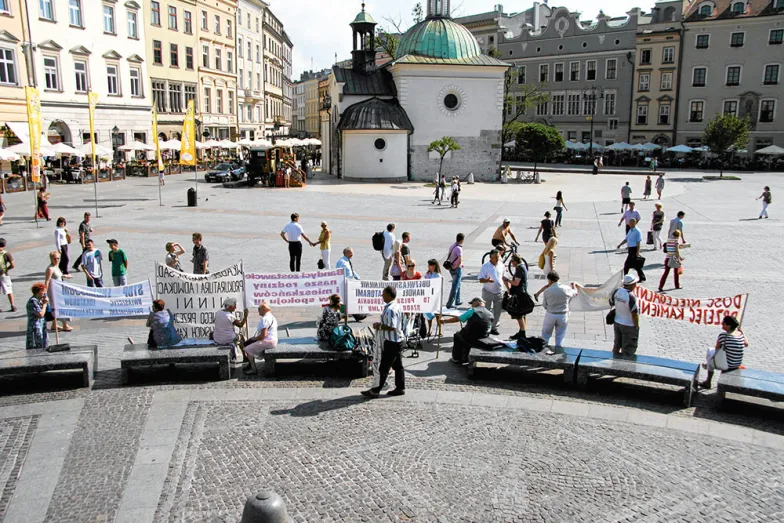
Too Far From the Sea
“I work here”, says Iśka. “I see the ladies who drive the horse-drawn carriages around the square more than I see my own mother. And I do appreciate that the Market Square continues to operate as a marketplace. Craft goods are sold here and there are also food fairs. The florists still sell flowers under umbrellas bearing the long-obsolete logo of a local radio station. For me these are valuable parts of the cityscape. A tourist will never notice such things”.
On 15 May, the “Kraków and Touristification” workshop is taking place at the café where Iśka works. It is run by Joaquín Linares from the ABTS. I listen in on Kraków residents discussing how they feel about the growing number of tourists.
Most of them tend to avoid the city centre and the Kazimierz district in summer, but they say this with regret because these are really nice places. There are also comments about litter, night-time noise, and the British and their stag parties. People can see that the Old Town is becoming like an open-air museum. Its entire infrastructure is geared towards visitors, and residents have to look elsewhere for their necessities. For instance, there is no kindergarten within the area encircled by the Planty Park. There are only two playgrounds and these were established quite recently. Mostly, however, the residents are happy. They know how much the city owes to tourism. It generates more than 10 per cent of all jobs in Kraków. They also remember what the Market Square used to look like in the evenings ten or twenty years ago – empty, silent, and desolate. They do not miss that Kraków.
Joaquín Linares recounts the process that has taken place in Barcelona. The participants of the workshop do not want that outcome either. “But we are not there yet”, they say. Indeed, the prevailing view is that we will never be. Kraków does not have this kind of tourist potential. It is too lacking, too cold, and too far from the sea to become a second Barcelona.
Marcin Wesołowski wonders: “Will Kraków ever share the fate of cities such as Barcelona or Venice? In the city centre, this has already happened. However, according to the surveys, only one in a thousand residents expects any measures aimed at curbing tourist traffic to be introduced. In fact, most people are hoping that it will grow even more. Apart from business, innovation, outsourcing and education, this city is based on tourism and is quite fond of the money that comes with it”.
The problem with the Barcelona model, explains Joaquín Linares, is that the huge earnings generated by tourism do not find their way into city’s coffers.
International corporations siphon their profits out of Catalonia, usually to an offshore tax haven. Meanwhile, tourism infrastructure is financed by the city. Linares calls this a “parasitic business model”. For the time being, there is no such danger in Kraków.
“Moreover, the city’s success boosts the entire region”, adds Marcin. “Apart from Kraków, many tourists also visit the Tatra mountains, Wieliczka, Tarnów, etc. As a result, a typical resident of Kraków tends to complain vociferously for a while, but ultimately accepts things the way they are. It’s hard to imagine that we will soon be writing ‘Tourists go home!’ on the walls”.
The Market Square Scrubs Up
I asked the residents whether they still saw anything of value in the Market Square. Was there anything that a tourist was unlikely to notice?
“They say that it’s an open-air museum”, says Michał, a university student. “But when I was crossing the square recently, I saw that the Wierzynek Restaurant was on fire. I immediately felt sad because it’s a part of our history. Later I saw that all the media were writing about the fire. So it’s not just an open-air museum. For us, these are also symbols of the city”.
“I love the Market Square in the morning”, says Iśka. “All those outdoor cafés before they are properly set up. Waitresses without any make-up, sipping coffee. They gossip as they carry chairs to the tables. The entire Market Square is scrubbing up for the rest of the day. A tourist who enters an elegant restaurant three hours later will never know that the vegetables he eats for lunch were brought by a van driver in grey fleece with a cigarette hanging out of his mouth”.
“I see more in the buildings than tourists do”, says Kamila. “I studied here, went on a date there, and excellent kebabs used to be sold over there. I think that a tourist just walks into a club without thinking much, whereas I remember that I used to buy beer illegally there. I recall that I was 16 at the time and terribly scared. I still remember the jumper I wore”.
“I meet the same people all the time: the postman, the couriers; I go to the same cafés”, says Marcin. “The lady at the newsstand knows exactly what I want. I take my cigarette break in the biggest market square in Europe. And as I smoke, I sometimes correct the guides when I hear that they have got something wrong”. ©
KRAKÓW. ANTROPOLOGIE DZIEDZICTWA – CZYTAJ CAŁY DODATEK SPECJALNY >>>
KRAKOW. ANTHROPOLOGIES OF HERITAGE – READ MORE IN ENGLISH >>>


